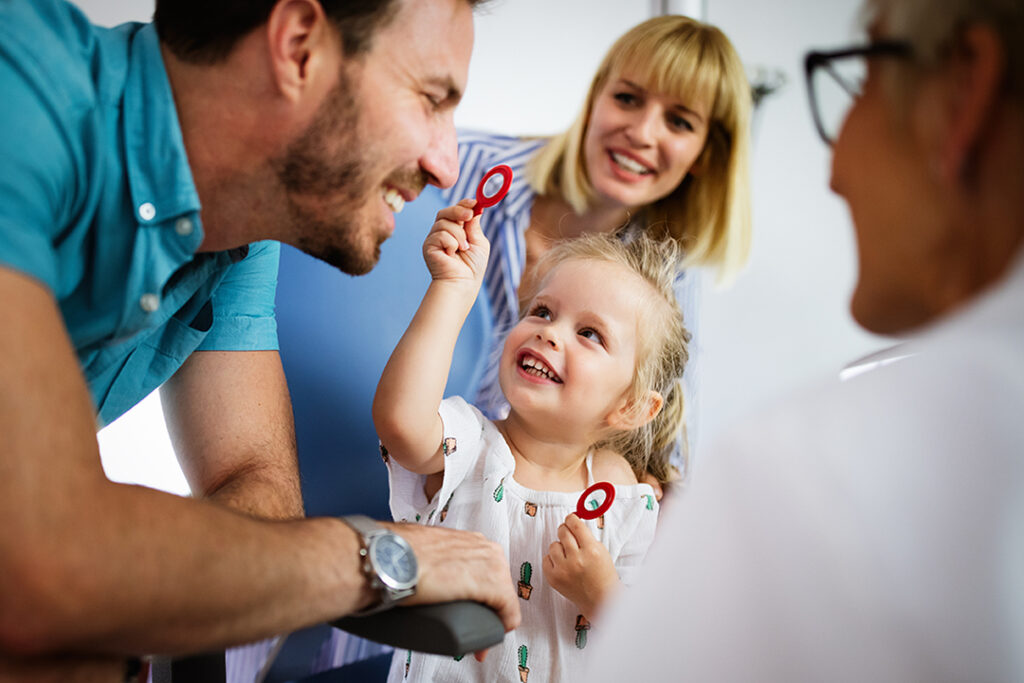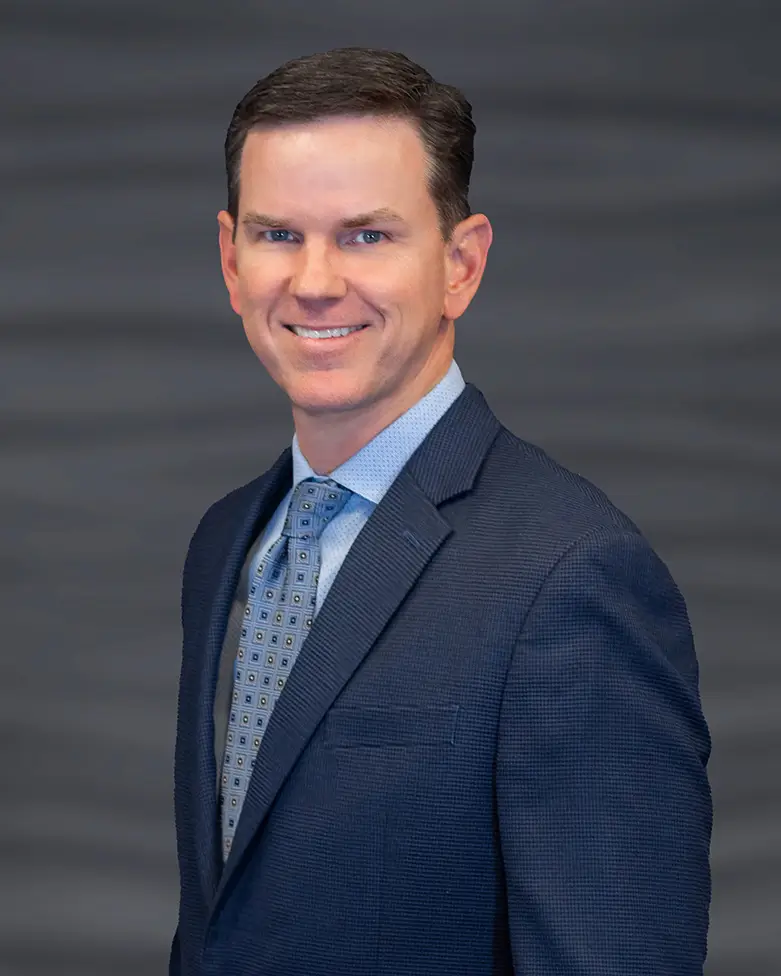
Choosing the right eye doctor for your child is an important decision that can impact their vision and overall development. At Pediatric Eye Specialists, we understand the unique needs of children and provide care that’s tailored to support their best possible future. From experience and training to how a clinic handles young patients, there are several factors to keep in mind when evaluating options. This checklist will help you make an informed choice with confidence. Schedule an appointment with Pediatric Eye Specialists today to ensure your child receives the expert care they deserve.
9 Factors to Consider When Choosing A Kid’s Eye Doctor
1. Choose a Doctor Who Can Do It All
When selecting a kid’s eye doctor, it’s helpful to find a provider that can handle everything from routine eye exams to complex medical treatments and even surgery. Pediatric Eye Specialists is staffed by board-certified pediatric ophthalmologists who do it all—comprehensive exams, diagnosis and treatment of medical eye conditions, and surgical care when needed. They also offer routine vision checks and prescriptions for glasses or contact lenses, all in one place. Plus, with Special Eyes Optical—Texas’ only eyewear shop exclusively for children—located inside PES offices in Fort Worth, Mansfield, and Keller, your child can be fitted for glasses without ever leaving the building.
2. Credentials and Experience
Look for a board-certified ophthalmologist with specific training in pediatric eye care. Pediatric Eye Specialists is proud to have a team of doctors who are not only board-certified but have extensive experience treating children of all ages. Our physicians specialize in pediatric ophthalmology and have managed a wide variety of childhood eye conditions with care and precision. You can feel confident that your child is in the hands of professionals who understand both the medical and emotional needs of young patients.
3. Recommendations and Reputation
A trusted recommendation goes a long way when selecting a child’s eye doctor. Many families come to Pediatric Eye Specialists based on referrals from pediatricians, teachers, and other parents in the community. We encourage families to read our online reviews and see firsthand how other parents describe their positive experiences with our team. Reputation matters, and we strive to maintain the highest level of trust with every family we serve.
4. Office Environment and Kid-Friendliness
Children need to feel safe and comfortable during an eye exam. At Pediatric Eye Specialists, we’ve created a kid-friendly environment designed to ease anxiety and make visits more enjoyable. Our doctors and staff are experienced in working with children, using age-appropriate language and gentle communication to help even the most nervous kids feel at ease. A warm, welcoming environment makes a big difference in your child’s experience—and their willingness to return for future care.
5. Comprehensive Services
Pediatric Eye Specialists offers a full range of pediatric eye care services under one roof. From routine eye exams and vision testing to the diagnosis and treatment of eye diseases, our team provides the comprehensive care children need as they grow. We also perform surgical procedures when necessary and offer pediatric-specific assessments like dilation, color blindness testing, and more. Ask what’s included in your child’s exam—we’re here to answer all your questions and provide clear explanations.
6. Insurance and Cost
Understanding insurance and cost is an important part of planning for your child’s care. Pediatric Eye Specialists accepts a wide range of insurance plans and provides transparent information about exam costs, eyewear, and potential treatments. Our team is always available to help you navigate your options so you can make informed decisions about your child’s eye health.
7. Location and Accessibility
Convenience matters, especially when follow-up visits are needed. With multiple locations throughout North Texas, Pediatric Eye Specialists makes it easy for families to access expert care close to home or school. We offer flexible scheduling and responsive care for urgent concerns so that your child’s vision needs are addressed without delay.
8. Communication and Follow-Up
Clear communication is essential—especially when it comes to your child’s eye health. At Pediatric Eye Specialists, we take the time to explain diagnoses, treatment options, and next steps in a way that both parents and children can understand. We prioritize thorough follow-up and are available to answer any questions you have after your visit, ensuring continuity of care and peace of mind.
9. Special Needs and Additional Support
Children with special needs may require tailored care, and our team is experienced in providing thoughtful, individualized support. Pediatric Eye Specialists is committed to accommodating a wide range of developmental and medical needs to ensure every child receives the care they deserve in a respectful and supportive environment. Let us know about any special considerations—we’ll work with you to make the experience as smooth as possible.
Start your child’s journey to better vision today.
Embrace a future of clearer vision and confidence for your child. Contact us now to book your consultation at any of our convenient locations across the Metroplex.
Ready to Find the Right Eye Doctor for Your Child?
Choosing a pediatric eye doctor doesn’t have to be overwhelming when you know what to look for. At Pediatric Eye Specialists, we check every box—expertise, compassion, convenience, and comprehensive care tailored to kids. Whether your child needs a routine vision check or ongoing treatment for a complex condition, our team is here to help them see their brightest future. Schedule a consultation with Pediatric Eye Specialists today and take the first step toward confident, compassionate care for your child’s eyes.
FAQ’s About How To Choose A Kid’s Eye Doctor
What qualifications should a children’s eye doctor have?
When choosing a kid’s eye doctor, make sure they’ve completed medical school followed by a residency in ophthalmology, with further specialization in pediatrics. At Pediatric Eye Specialists, our doctors have advanced training focused exclusively on the developing human eye, ensuring expert care for every stage of childhood vision development.
How can I tell if my child needs to see an eye doctor?
If your child is squinting, complaining of headaches, struggling with reading, or showing signs of a visual impairment, it may be time for a professional evaluation. Pediatric Eye Specialists offers comprehensive eye examinations to detect issues early and help your child see clearly and comfortably in everyday life.
Should I choose an optometrist or an ophthalmologist for my child?
Optometry focuses on vision correction and routine care, while ophthalmologists can diagnose and treat complex conditions. At Pediatric Eye Specialists, our board-certified pediatric ophthalmologists provide both routine and medical eye care, so your child receives the right level of expertise for every need.
Is the office environment important when choosing a kid’s eye doctor?
Yes—an office that understands pediatrics will help put children at ease. Pediatric Eye Specialists is designed to be kid-friendly, with staff trained to support young patients emotionally and physically, making visits less stressful and more productive for families.
What vision problems should I ask about when choosing a doctor?
Ask if the doctor has experience diagnosing and treating conditions like amblyopia, strabismus, and other common childhood eye issues. Pediatric Eye Specialists is known for our work in detecting and managing these problems early, which can greatly improve your child’s visual acuity and long-term outcomes.
How do I know if the eye doctor uses child-appropriate techniques?
Look for a practice that uses pediatric-specific tools, child-friendly communication, and gentle procedures. At Pediatric Eye Specialists, our team understands how to assess visual perception and function in children using age-appropriate methods—making exams effective and less intimidating.
What role do eye drops play in children’s eye exams?
Eye drops are often used to dilate pupils or relax focusing muscles during an eye examination. At Pediatric Eye Specialists, we use them carefully and explain their purpose to both parent and child to minimize anxiety and ensure accurate results.
How does early vision care affect a child’s daily life?
Good vision is critical for learning, playing, and participating fully in everyday life. Pediatric Eye Specialists works to detect and treat vision issues before they interfere with development, helping children thrive in school, sports, and social situations with improved confidence.
Can vision therapy help my child?
In some cases, yes—especially for children with focusing problems or eye coordination issues. While Pediatric Eye Specialists focuses on medical treatment and surgical care, we coordinate with trusted therapy providers when vision therapy is the right approach for improving function.
Will my child need glasses or corrective lenses?
Corrective lens prescriptions are common if your child has difficulty seeing clearly at any distance. Pediatric Eye Specialists not only handles the prescription process during the exam but also offers access to Special Eyes Optical, our in-house eyewear shop designed just for kids.
Dr. Eric A. Packwood is a Partner at Pediatric Eye Specialists, President of the Child Vision Center, and the Administrative Director of Ophthalmology at Cook Children’s Medical Center. He graduated from Rice University and Baylor College of Medicine, and completed his ophthalmology residency at St. Louis University as chief resident, followed by a fellowship at Washington University.
Since moving to Fort Worth in 2000, Dr. Packwood has been recognized as a “Super Doctor” by Texas Monthly, a “Best Doctor for Your Child” by D Magazine, and a “Top Doc” by Fort Worth, Texas magazine. He volunteers at the Alexander Eye Clinic and is involved in medical mission work for underprivileged children. Dr. Packwood has also published several peer-reviewed articles and participated in multiple clinical trials.
